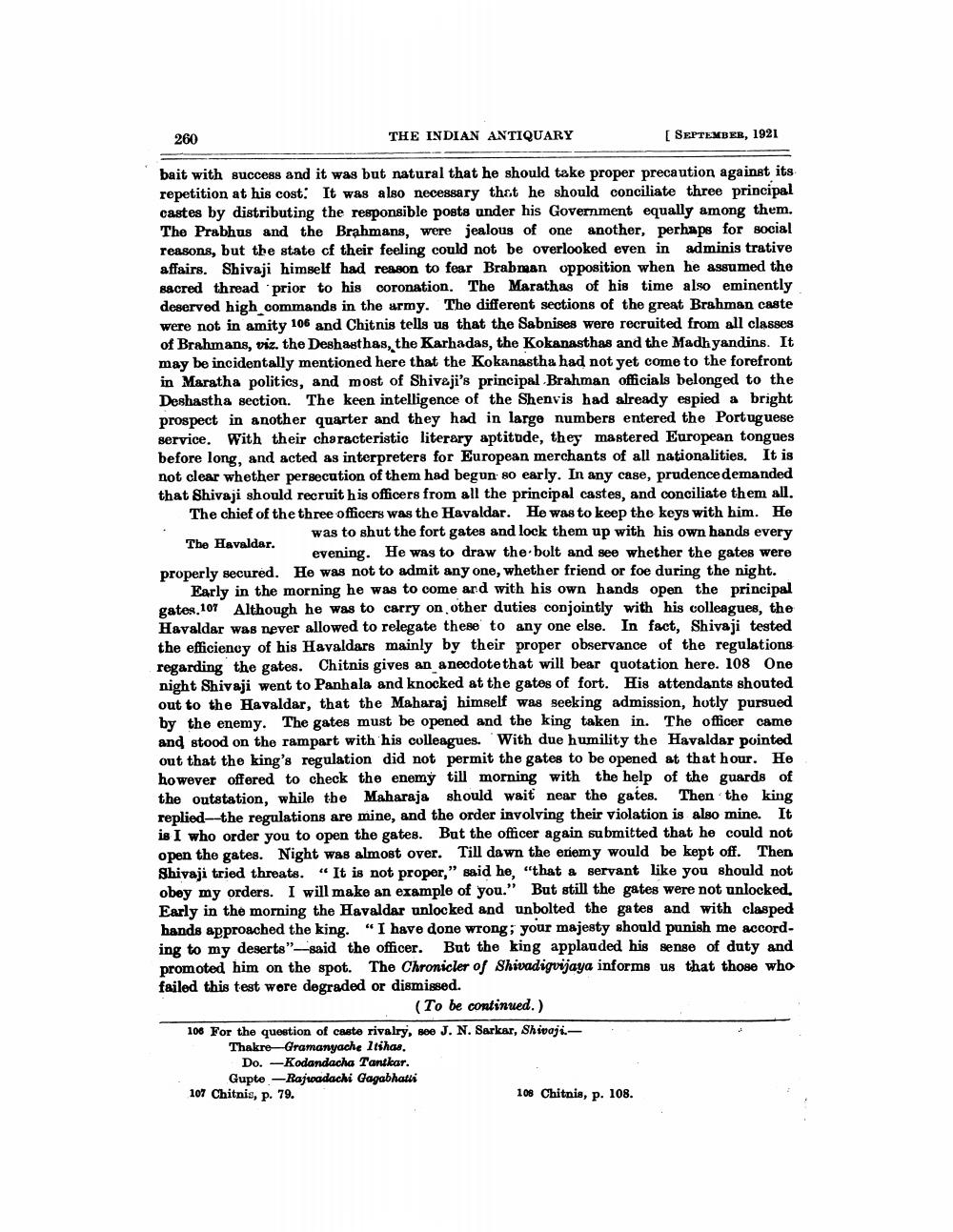________________
260
THE INDIAN ANTIQUARY
[ SEPTEMBER, 1921
bait with success and it was but natural that he should take proper precaution against its repetition at his cost: It was also necessary that he should conciliate three principal castes by distributing the responsible posts under his Government equally among them. The Prabhus and the Brahmans, were jealous of one another, perhaps for social reasons, but the state of their feeling could not be overlooked even in administrative affairs. Shivaji himself had reason to fear Brabman opposition when he assumed the sacred thread prior to his coronation. The Marathas of his time also eminently deserved high commands in the army. The different sections of the great Brahman caste were not in amity 106 and Chitnis tells us that the Sabnises were recruited from all classes of Brahmans, viz. the Deshasthas, the Karhadas, the Kokanasthas and the Madh yandins. It may be incidentally mentioned here that the Kokanastha had not yet come to the forefront in Maratha politics, and most of Shivaji's principal Brahman officials belonged to the Deshastha section. The keen intelligence of the Shenvis had already espied a bright prospect in another quarter and they had in large numbers entered the Portuguese service. With their characteristic literary aptitude, they mastered European tongues before long, and acted as interpreters for European merchants of all nationalities. It is not clear whether persecution of them had begun 80 early. In any case, prudence demanded that Shivaji should recruit his officers from all the principal castes, and conciliate them all.
The chief of the three officers was the Havaldar. He was to keep the keys with him. He The Havaldar.
was to shut the fort gates and lock them up with his own hands every
. evening. He was to draw the bolt and see whether the gates were properly secured. He was not to admit any one, whether friend or foe during the night.
Early in the morning he was to come ard with his own hands open the principal gates. 107 Although he was to carry on other duties conjointly with his colleagues, the Havaldar was never allowed to relegate these to any one else. In fact, Shivaji tested the efficiency of his Havaldars mainly by their proper observance of the regulations regarding the gates. Chitnis gives an anecdote that will bear quotation here. 108 One night Shivaji went to Panhala and knocked at the gates of fort. His attendants shouted out to the Havaldar, that the Maharaj himself was seeking admission, hotly pursued by the enemy. The gates must be opened and the king taken in. The officer came and stood on the rampart with his colleagues. With due humility the Havaldar pointed out that the king's regulation did not permit the gates to be opened at that hour. He however offered to check the enemy till morning with the help of the guards of the outstation, while the Maharaja should wait near the gates. Then the king replied-the regulations are mine, and the order involving their violation is also mine. It is I who order you to open the gates. But the officer again submitted that he could not open the gates. Night was almost over. Till dawn the enemy would be kept off. Then Shivaji tried threats. “It is not proper,” said he, "that a servant like you should not oboy my orders. I will make an example of you." But still the gates were not unlocked. Early in the morning the Havaldar unlocked and unbolted the gates and with clasped hands approached the king. "I have done wrong, your majesty should punish me according to my deserte" said the officer. But the king applauded his sense of duty and promoted him on the spot. The Chronicler of Shivadigvijaya informs us that those who failed this test wore degraded or dismissed.
(To be continued.) 106 For the question of caste rivalry, see J. N. Sarkar, Shivaji.
Thakre Gramanyache Itihas.
Do. -Kodandacha Tantkar.
Gupte -Rajwadachi Gagabhatli 107 Chitnis, p. 79.
108 Chitnis, p. 108.




